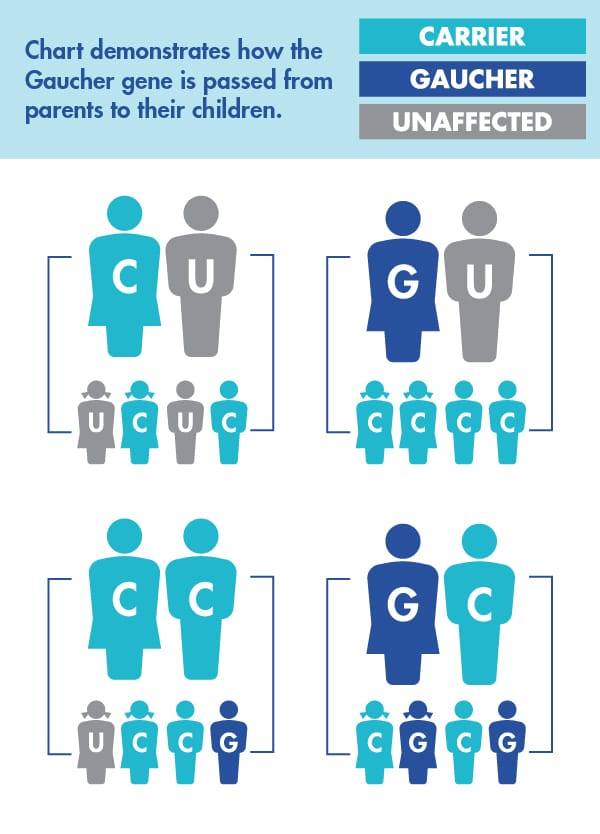If you are a carrier of Gaucher disease (pronounced go-SHAY), it means you do not have the disease but can pass the Gaucher gene to your children.
People of all ethnic backgrounds may be carriers of Gaucher disease, but it is especially common among Ashkenazi (Eastern European) Jews. Approximately 1 in 10 are carriers, which is why testing for Gaucher disease are so important for this group.
What It Means If You Are a Gaucher Disease Carrier
Most genes come in pairs, and each pair is made up of one gene each from your mother and father. When just one of these is the Gaucher gene, you are a carrier. When both in the pair are the abnormal gene, you will have Gaucher disease.
True carriers do not have symptoms, but they may pass the Gaucher gene to their children. Gaucher disease carriers also have a slightly increased risk of Parkinson disease, but most will never develop this condition. Find out about Gaucher disease and associated conditions.
Genetic Testing for Gaucher Disease Carrier Status
Genetic testing for Gaucher disease carrier status involves a saliva or blood sample to obtain DNA. Scientists have identified more than 400 genetic mutations associated with Gaucher disease, and having even one makes you a carrier. A targeted mutation test will find about 89 percent of carriers, while a full gene sequencing will identify over 99 percent. The beta-glucosidase leukocyte (BGL) test cannot reliably detect carriers.
Up to 1 in 10 Ashkenazi Jews may be carriers, making Gaucher disease the most common inherited Jewish genetic disease. If you are a member of this group, physicians recommend special prenatal tests to screen for Gaucher disease and other disorders. Learn more about prenatal screening and genetic counseling for Gaucher disease.
Will My Child Have Gaucher Disease?
If you are a Gaucher disease carrier, your children have an increased chance of either being carriers or having the disease themselves. The outcome depends on the status of the other parent:
- If your partner is not a carrier: Each of your children has a 50 percent chance of being a carrier and a 50 percent chance of being unaffected.
- If your partner is also a carrier: Each of your children has a 25 percent chance of having Gaucher disease, a 50 percent chance of being a carrier and a 25 percent chance of being unaffected.
- If your partner has Gaucher disease: Each of your children has a 50 percent chance of having Gaucher disease and a 50 percent chance of being a carrier.
Prenatal screening and genetic counseling for Gaucher disease can help determine the risk of your child having Gaucher disease. However, it is important to remember that people with Gaucher disease may never experience symptoms at all.
What If I Have Symptoms?
True carriers do not have Gaucher disease and experience no symptoms. If you have symptoms of Gaucher disease, you may need to be retested.
There are more than 400 genetic mutations known to cause Gaucher disease. Not all of these were known decades ago, nor do all screening tests today cover every single one of them. In rare cases, it is possible for genetic screening to miss a mutation. An enzyme test called a beta-glucosidase leukocyte (BGL) test will almost certainly show if you have Gaucher disease. Find out about testing for Gaucher disease.
Additional Resources on Gaucher Disease Carrier Testing
If you are looking for more information on whether you are a Gaucher disease carrier, these resources may be helpful:
- Center for Jewish Genetics: The Center for Jewish Genetics is an educational resource for hereditary cancers and Jewish genetic disorders. The center offers subsidized genetic counseling and screening.
- Jewish Genetic Disease Consortium: The Jewish Genetic Disease Consortium is an alliance of nonprofits that encourages genetic screening for everyone who has any Jewish heritage.
- Victor Center for Jewish Genetic Diseases: The Victor Center for Jewish Genetic Diseases provides affordable genetic counseling and screening for healthy people who are at risk of being carriers.
- JScreen: JScreen is a nonprofit public health initiative that provides easy home test kits for people of Jewish descent. Genetic counselors from Emory University School of Medicine assess the results and provide additional information and resources.
- 23andMe: 23andMe was founded to empower individuals and develop new ways of accelerating research. The members of 23andMe have come together because we believe in the combined potential of genetics and the Internet to have a significant, positive impact. These core values represent what motivates us at 23andMe.
- National Society of Genetic Counselors: The National Society of Genetic Counselors is an online directory where you can search for a genetic counselor in your area.
Find out more about resources for Gaucher disease patients and families.
